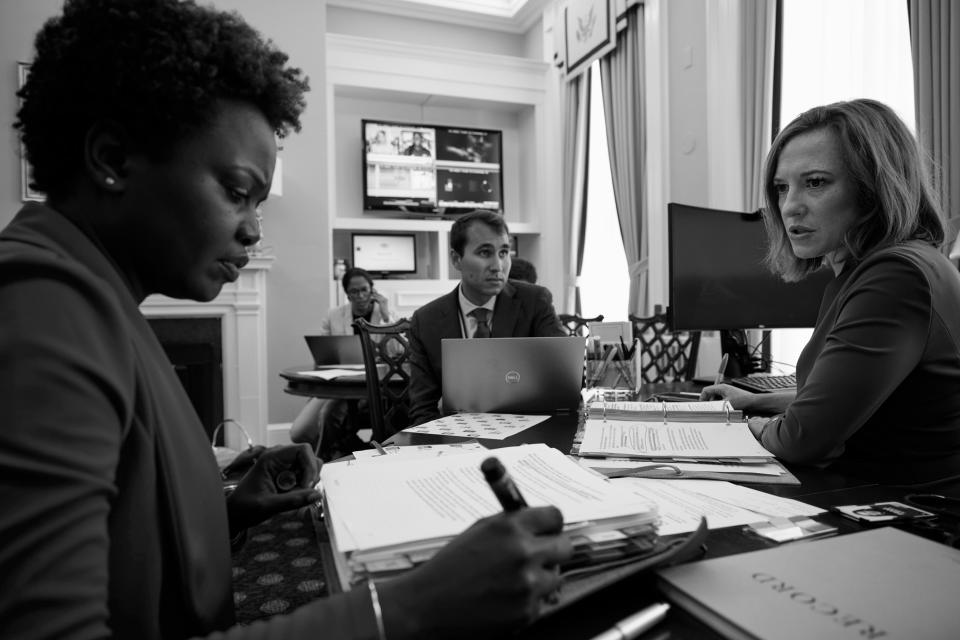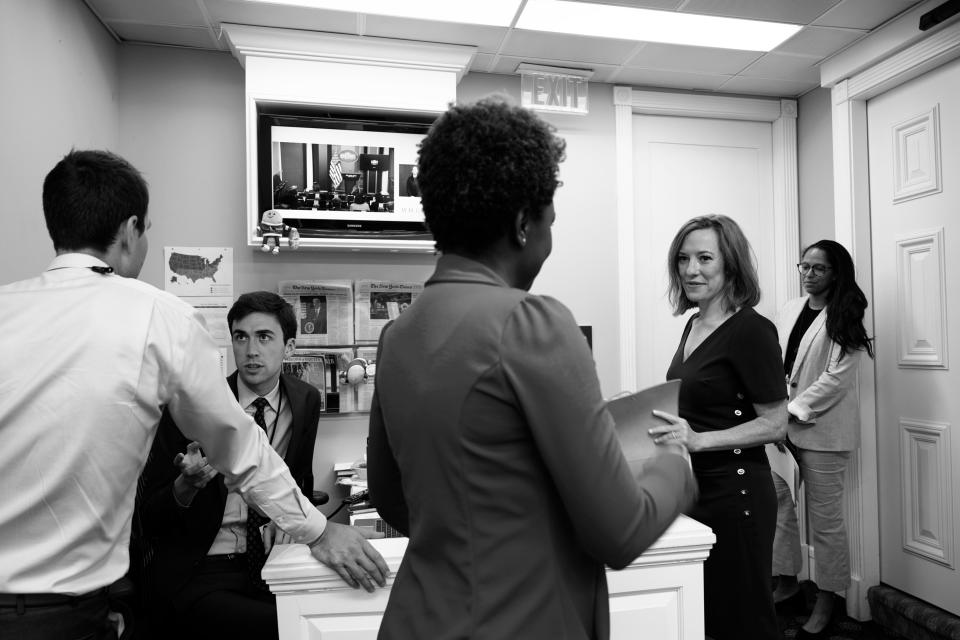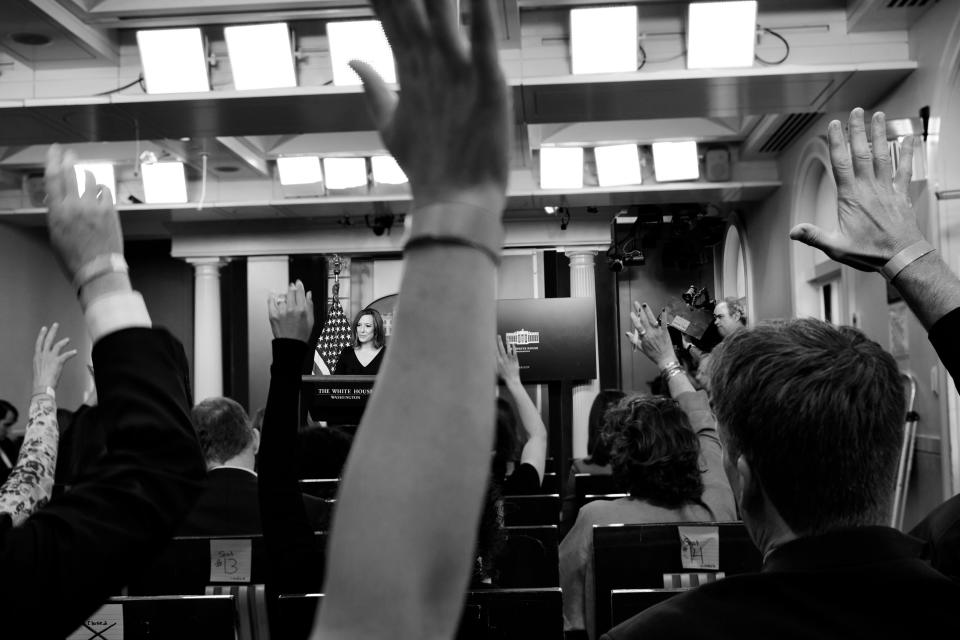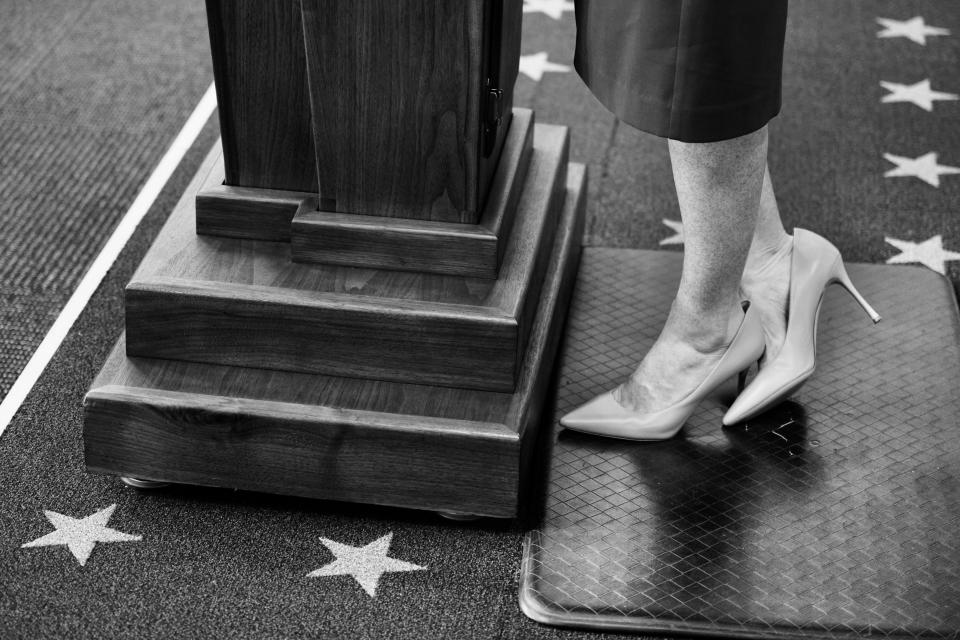Press Secretary Jen Psaki is Good At Mending Fences. Just Don’t Call Her Nice.
- Oops!Something went wrong.Please try again later.
- Oops!Something went wrong.Please try again later.
It’s a summer Friday. President Biden is at his Delaware beach house, where he delivered a brief speech about that morning’s encouraging jobs numbers. Washington, D.C., is quiet—some might say eerily so. (The lead from Michelle Goldberg’s column that morning in The New York Times: “We are in the eye of the storm of American democratic collapse.”) There is still news to be reckoned with. Reporters have questions about the president’s infrastructure negotiations with Senate Republicans, his upcoming meeting with Vladimir Putin, and the rising threat of ransomware attacks. Today, as on most days, the person fielding these questions will be the White House press secretary, Jen Psaki, a 42-year-old communications operative with a straight red bob and a high-collared teal dress.
When Psaki first appeared in the press briefing room, in January 2021, there was a collective swoon from roughly half the country. This was largely due to what she was not doing: berating the assembled reporters, griping about CNN’s coverage of a presidential tweet, or spouting flagrant, easily disprovable lies. Like her boss, Psaki was being graded on a curve. The New Yorker writer Jelani Cobb tweeted, “I really should not be impressed with a calm, professional, and factual press briefing, but I am where I am.”
But as the weeks went on, another consensus formed: Psaki was good at this—and not just compared with Kayleigh McEnany and Sean Spicer. She had a mixture of warmth, humor, intelligence, and edge. On Twitter, her fans deployed a hashtag for moments when she dispensed with a foolish or spuriously framed question: #PsakiBomb. In one clip, Peter Doocy, of Fox News, attempts to knock her off course. “I just heard you describe the infrastructure negotiations as the ‘art of seeking common ground,’ ” he says. “At some point, does that become the ‘The Art of the Deal’?” Psaki shoots back, “I don’t know. You’re the professional here, Peter. You’re the TV star….What’s the Fox chyron gonna be?” Her former White House colleague David Axelrod has called Psaki the best press secretary in his lifetime. “She’s unflappable,” he tells me. “It’s very easy under the glare of those lights and the intense questioning to buckle or to become ornery. She never does. As Biden would say, she has a steel rod for a spine.”
The White House reporters I speak to more or less agree. They appreciate her practice of calling on everyone, including Doocy, and her civility, even when she’s implying
that a story they’ve written is daft. The Times’s Peter Baker, who’s been on the White House beat since the Bill Clinton administration, says that Psaki’s tenure feels like a return to an earlier era. “She’s lowered the temperature and gotten us back to a more stable, if adversarial, relationship.” On the downside, he adds, “the briefings are not exceptionally informative”—a trend that he notes didn’t begin with Psaki. And, despite Biden’s garrulous reputation, “they’ve been pretty buttoned up and tight with information—much to our frustration at times.”
According to Psaki, the most important thing about speaking on Biden’s behalf is getting the tone right. “The first thing he said to me was ‘We need to be aligned on tone,’ or, really, he needs me to be aligned with him,” she tells me. “He said, ‘We are healing a country whose nerves have been frayed. It’s just a little bit frantic. We need to be projecting calm, openness to engagement, governing for all people.’ ” She goes on, “It doesn’t mean you don’t have moments where you are tough or firm or make clear to people when they’ve crossed a line. He does that, too.” But, she says, the tone thing “is really my North Star.” It’s questionable how far it will go in a country where, according to one poll, a quarter of citizens, and more than half of Republicans, believe that Donald Trump is the “true president.” But Psaki says the administration thinks it can make inroads not by “wrestling with alligators—or former alligators, or the people around them—but by delivering results.” She goes on, “That’s what we’re betting on. We’ll see if we’re right.”

Psaki with Karine Jean-Pierre, the principal deputy press secretary and senior advisor to the press secretary (far left), and Kevin Munoz, the assistant press secretary.
It’s a little after 9 a.m., and Psaki is in her office, a place that, like the rest of the West Wing, is smaller and more modest than I’d pictured it. There’s blue carpeting and taupe curtains bearing the presidential seal. The walls are decorated with artwork by Psaki’s children, ages three and six, and a few carefully curated photographs representing various stops on her rise through Democratic politics: Psaki, in sunglasses, sitting on a plane next to John Kerry (she was his spokesperson when he was Secretary of State); President Obama crawling on the floor of the Oval Office with Psaki’s infant daughter (Psaki began her tenure as his communications director when she was six months pregnant). In one picture, Psaki stands in the middle of a large, grinning crowd of Democratic notables: Obama, Hillary Clinton, Valerie Jarrett, Susan Rice. Psaki is one of several former White House deputies now occupying top roles. Her contemporaries include Kate Bedingfield, the communications director; Jake Sullivan, the national security adviser; and Brian Deese, the director of the National Economic Council, who is set to join her at that day’s press briefing, in a practice that she calls “lifting up the people behind the policy.”
Psaki sits at a semicircular desk, in the teal dress and open-toed tan patent leather heels, with a leather briefing binder spread out before her, its sections labeled COVID, DOJ, DRUGS, ECONOMY. She has an Apple watch on one wrist and, on her desk, a neon-green water bottle that flashes occasionally, reminding her to hydrate. Some press secretaries have asked not to be told about sensitive government information, so they don’t risk saying something they shouldn’t. But Psaki is a completist. When she’s gathering information, “I always want to know the whole story,” she says. “And then I can ask, ‘Okay. Can I say this? Can I say that?’ ” Biden’s the same way. Some staffers get annoyed by his endless requests for data and details, but Psaki says, “I get it. He wants to know everything, so he can figure out what his position is.”
Underlings file in and out, delivering “toppers,” or updates on various Biden projects. Psaki makes notes in colored Sharpie, peppering them with queries and little interjections. First, immigration. Psaki asks a young staffer about Vice President Kamala Harris’s trip to Guatemala and Mexico. “Did we decide we’re going to do a topper on the VP trip? Do we know if she’s got big deliverables from that?”
“There will be some tangible border stuff,” the staffer says. “But I think she’s doing a big sit-down interview there.”
“Oh, right, with Lester Holt!” Psaki says.
Another staffer wraps up an economic briefing by saying, “Your water bottle is reminding you to drink.”
Psaki picks up the flashing bottle and laughs. “You want one!” she teases, and asks another staffer, “When’s her birthday?”
Psaki grew up in Greenwich, Connecticut—but not exactly that Greenwich. “There’s a lot of hippie vibe in my family,” she tells me. She’s the oldest of three daughters: Her youngest sister, a Unitarian Universalist minister, does indeed send out hippie vibrations, as does her mother, a therapist who grew up in blue-collar Queens. Psaki’s father, a retired real estate developer, declared bankruptcy when she was in seventh grade. “We were in this nice neighborhood, and I was the kid who was on the scholarship in middle school,” she recalls. “Was it traumatizing? Not really, but everybody has a story.” For the most part, Psaki was focused on her high school swim team—she had a powerful backstroke—and, later, on her sorority, Chi Omega at the College of William & Mary. She was the president, but then, as now, she didn’t seem to want to be the center of attention. “She’s an under-the-radar leader,” her college roommate, Ally Wagner, tells me. Psaki quit the college swim team after two years but stayed “crazy athletic,” Wagner says. Katie McCormick Lelyveld, who got to know Psaki early in her career, describes her as “a deeply devoted friend,” and despite her work ethic, “she knows how to relax and laugh, and she likes a dance party.” As for the music, “she’s a Top 40 girl,” McCormick Lelyveld says. But not current stuff. “The music that was popular during her 20s and 30s.” She mentions the CD compilations Now That’s What I Call Music.

With colleagues including press assistant Michael Kikukawa (second from left) and Amanda Finney, the chief of staff for the press office and special assistant to the press secretary (far right).
Psaki ended up in politics at the age of 23, after “an early quarter-life crisis” led to a job as a door-knocker with the Iowa Democratic Party. She liked the feeling of being part of something bigger than herself. But, mostly, she liked the people. “The kinds of people you meet on political campaigns are some of the best human beings,” she tells me. “They’re survivors, and they’re spunky, and they have personalities, and they spend months sleeping on couches and living on, whatever, pizza and coffee and bad beer.”
Psaki joined the Obama campaign before the 2008 Democratic primaries, after working at the DCCC, where she met her husband, Gregory Mecher, now a Democratic political aide. That had been a high-intensity experience, but a presidential campaign is something else. She was assigned to manage the “press bus”—the giant caravan of reporters trailing the superstar candidate across the country. The assignment was supposed to be one month long, but it turned into six. When she called back to headquarters, she says, “they’d tell me, ‘Just stay on the bus. Keep going.’ ” (She and Mecher had to do the long-distance thing.) Axelrod says that Psaki’s unflappability made her indispensable. “Things happen on the road. You’re faced with a shitload of reporters, and all of them have different stories they’re working on and problems and needs. When she went out on the road, things would go smoothly. She’d handle it. She’d manage what needed to be managed. That’s an incredibly important quality in this business.”
Obama-world was famously harsh with the press. “Some people have this mistaken belief that it was warm and cozy,” Baker tells me. “But they really didn’t hold back from telling us all the ways they thought we were stupid.” Psaki recalls of the Obama people, “They’re my friends, and they are some of absolutely the most talented and best people I worked with in politics, but the culture was to yell at reporters, slam the phone down.” After traveling with journalists for weeks on end, and, in many cases, bonding with them, Psaki realized, “That’s never going to be comfortable to me.” Instead, she developed a more personable rapport—charming her interlocutors with little jokes, asking about their hometowns and families. She’s not a pushover, though. At one point, she tells me that she hates when people describe her as “nice.” “It is like nails on a chalkboard,” she says. “And it still happens. I was introduced to a foreign delegation in the hallway the other day as ‘This is Jen. You may have seen her do the briefings. She’s a really nice person.’ I’m like, Really? You can’t think of a better description?” The word is sexist and a little diminishing, but, she says, “it’s also this desire to put people in a box. Yes, sometimes I’m friendly and joyful, and sometimes I’m tough, and sometimes I’m straightforward.” After shadowing Psaki for a bit, I start to think that her real gift is her ability to be several of these things at the same time. Many of her cheerful quips are actually ways of shutting down a line of questioning. When there’s information the administration is not ready to share yet, she’ll respond with a chipper “Stay tuned!” or “Buckle up!” Or she’ll brush aside questions about tense dealmaking by chirping, “Democracy in action!”
Psaki was up for the press-secretary role twice during the Obama administration, losing out first to Jay Carney and then to Josh Earnest. The second time around, “I was devastated,” she told Axelrod on his podcast. “But that’s also a good life experience for you.” During the Obama years, she became a mother and worked as White House communications director, which left her even more prepared: “I’ve also been through legislative battles. I’ve been through global crises. I’ve been through, unfortunately, many mass shootings...there’s little that’s going to unbalance me.”
As spokesperson for the State Department, she had the character-building experience of becoming a subject of Russian propaganda. In 2014, Russia invaded Ukraine, and Psaki became the voice of the U.S. as it condemned the invasion. RT, the Russian state-funded news network, launched a campaign to cast her as an airhead, publishing a list of what it called “Jen Psaki’s Most Embarrassing Fails.” There were T-shirts printed with Psaki’s face, and conspiracy theories about a rumored pregnancy. Some of the criticism found its way into the U.S. media. “At first, it was upsetting,” Psaki says. “I remember talking about it at a briefing and getting a little choked up, because you feel like you are being picked apart.” Eventually, some seasoned Russia correspondents explained the dynamic: “They were like, ‘This is a badge of honor. This is telling you that your message is getting through, and they need to discredit you to their public.’ ” (Putin kept it up after his meeting with Biden in Geneva in June, saying that while the American president is “collected,” “his press secretary is a young, educated, beautiful woman who’s always mixing things up.”)

Psaki’s State Department years turned out to be good preparation for the current political environment. One lesson: Propaganda is not personal. You just have to “be a big girl,” she says, recognize the strategic objectives behind it, and address misinformation head-on. “By the end of my time at State, I started to have fun with it,” she recalls. She would mock the rumors herself and tease the RT reporters when they needled her during press briefings.
At 11:30 a.m., Emily Horne, the spokesperson for the National Security Council, arrives to brief Psaki on foreign-policy issues. They make a high-speed tour of crises and threats in every corner of the world, landing on Iran. “Another one for you,” Horne says. “Brian Bennett of Time might be asking about Iranian disinformation campaigns.” In foreign-policy circles, these would be called “malign cyber-information operations,” but Horne says, “I’m really working hard to not say malign anymore. I want that word out of my vocabulary.” This is a Biden directive. Along with tone, Psaki explains, the president is focused on eliminating bureaucratic jargon that might confuse or alienate the public. She recalls briefing him on COVID-relief checks. “He said, ‘How are you explaining how people are going to get these checks if they don’t file taxes?’ I said, ‘Well, if you are a non-filer—’ ” Biden interrupted her. “He’s like, ‘Non-filer? Nobody knows what that is. That’s not how anybody speaks.’ ”
Minutes before the day’s briefing, Psaki pulls a blow-dryer from under her desk and straightens her hair, then does her makeup while looking into a wall mirror. The Trump administration had a hair-and-makeup person on the payroll, but Psaki is a one-woman operation. She owes much of her current regimen—black eyeliner, simple lipstick—to a CNN makeup artist who has texted her tips. (Psaki has worked as a commentator for the network.) When it comes to her wardrobe, Psaki has a few long-standing preferences—bright colors, chunky necklaces—but she’s open to suggestions. “I have friends who know a lot more about fashion than I do who will text me and be like, ‘This dress would look great on you.’ Or ‘I’m going to drop off some dresses I’m not wearing anymore,’ ” she says. She’s not changing the straight red bob, though. “I couldn’t operate a curling iron to save my life,” she says. She opens a desk drawer full of barrettes, sent to the White House by older ladies who are apparently horrified to see her brushing her hair out of her face on television.
As she does her makeup, Psaki reflects, “On your best days, you think through the things that you want to proactively communicate.” She runs down the list: multiple paths forward on infrastructure. Positive jobs report. A shipment of vaccines on its way to South Korea. In the end, the moments from the briefing that go viral aren’t topics that she prepped—they’re what Psaki would call “wrestling with alligators.” She’s asked about Facebook’s decision to suspend President Trump until 2023. (Psaki: “It feels pretty unlikely that the zebra is going to change his stripes over the next two years. We’ll see.”) And she has an amusing exchange with Fox’s Doocy over his network’s current obsession, Dr. Anthony Fauci’s newly released emails. Doocy asks of Fauci, “Can you imagine any circumstance where President Biden would ever fire him?” Psaki replies with a curt “No.” Twitter lights up: #PsakiBomb.
That night, Psaki leaves the White House a few hours earlier than usual and drives home for pizza night, a weekly ritual with her family and her middle sister, Stephanie, a senior adviser at the Department of Health and Human Services. Stephanie is married to Adam Frankel, a former Obama speechwriter, and their two children are the same ages as Psaki’s. The families formed a bubble during the pandemic, and Psaki has said their weekly pizza nights have been psychological ballast, helping her to manage the time she spends away from home.

It’s a cozy suburban house, set against a hill, with blue hydrangeas in the backyard. Inside, the decor is spare. Ally Wagner, Psaki’s college roommate, claims that she was messy in her youth. “I changed,” Psaki says. “Now I’m a clean freak.” Stephanie is making margaritas at a juicer, while Mecher, Psaki’s husband, takes a frozen pizza out of the oven. Raya and the Last Dragon plays on a flat-screen TV. The children are stampeding over the hardwood floors. Psaki’s three-year-old son, Matthew, jumps into her arms. “Hi, bubs!” she says, picking him up and snuggling him. Psaki has long said that she plans to stay in the press-secretary role for around a year, although she tells me, “I’m not walking out the door on day 365.” She has many reasons for not lingering. “One, life.” She points to the kids. “All these guys get bigger, and you don’t want to miss things. Two, I’ve done it before. Not this job but versions of it. And three, you’ve met members of my team. These are really incredible people.” She wants to lift them up. “And also I love my husband, and he’s amazing, and I still want him to be married to me when I leave this place.”
The first year of an administration is an exciting time, Psaki says. “There’s just so much possibility.” When asked about her goals, she talks about her hopes for the White House communications apparatus. She’d love to modernize the press briefings and find ways to reach a wider swath of the public. As she discusses these things, I can’t help thinking of larger goals and of the question that seems to be hovering over the entire Biden presidency. To succeed, the president must maneuver his agenda through an evenly divided Congress and a faltering political system. What if he can’t pull it off? The administration’s communication strategy, like its electoral strategy, is based on the idea that results speak louder than words. But what if those results never come to pass?
When I ask Psaki about this, she mentions a photograph in her office—the one of her standing in a crowd of smiling Democrats: President Obama, Hillary Clinton, Susan Rice. It was taken on the night before the 2016 election. “All of us were so happy,” she says. They thought they were on the threshold of a Hillary Clinton administration. “We’re like, ‘It’s going to be amazing.’ ” It’s a tragic image, but Psaki keeps it in her office. “Because it’s a reminder of how things can change.” She can’t give us any guarantees about how things will work out. No one can. It’s the kind of thing that veterans like Psaki understand. She goes on, “There are times where you have to be on the journey and recognize that sometimes you don’t know what the end is going to be, right? Maybe it’s going to be great. And maybe it’s not.”
Originally Appeared on Vogue

